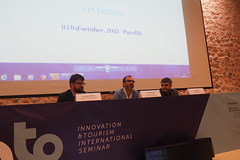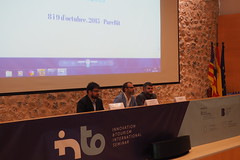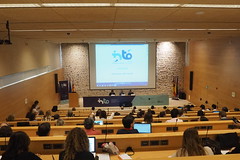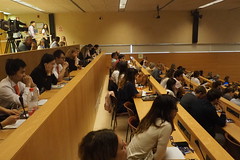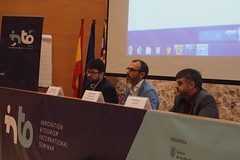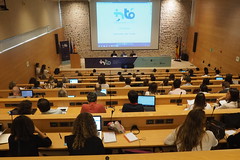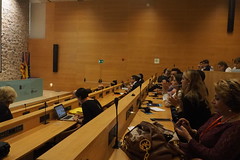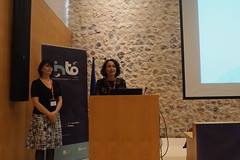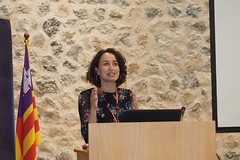INTO 2016
November 24 y 25, Palma
Hours0
Minutes0
Seconds
Experiential tourism as a key tool for deseasonalisation
For the past 10 editions, since the first INTO in 2004, a variety of themes related to tourism products have been analysed, such as culture, yachting and health, as well as marketing instruments like branding and the social media. We have also debated the new ways of addressing sustainability in the sector with major issues like climate change. Likewise, we have examined issues related to the evolution in the technology used in the tourism industry in order to analyse tourist behaviour and use these new technological tools to create and/or transform tourist destinations sustainably.
In this 11th edition, representatives from the public administrations, businesses, researchers, professors, students and professionals from a variety of fields will gather to speak about and analyse the concept of experiential tourism as a tool for deseasonalisation. Thus, on the 24th and 25th of November, we will analyse the impact of seasonality, present several strategic reflections on the need to design tourist experiences, study different models to create and introduce sustainable and responsible tourist products and experiences, and discuss what kinds of policies could be designed to lower seasonality. Furthermore, a participative workshop will be held with dynamics in design thinking and creativity in lateral thinking.
SESSIONS
Workshop: a participatory workshop with design thinking dynamics and creativity in lateral thinking
Title: Design of innovative experiences for the deseasonalisation of the destination
Objective:
To raise the awareness of entrepreneurs, agents in the sector and entrepreneurs related with TOURISM as regards the development of new, innovative tourist products with an experiential approach for the deseasonalisation of tourist resources and destinations.
Contents:
1.- Short introduction to experience tourism: a new value proposal for tourism.
2.- Trends in experience tourism: future opportunities.
3.- From a tourist product to a unique, authentic experience. Insights to be identified and classified.
4.- Hosperience Methodology: Hospes (guest)+experience. From tourists to guests: how to connect with emotions and sensations to achieve loyalty, consumer motivation and recommendation.
5.- The keys to the development and creation of an experiential tourism product: development of experiential scenarios and levers
6.- Experience is important, the context, the key: moments of truth
7.- Viewing of some success stories
The speakers of this session will focus on analyzing the impacts of the seasonality of tourism activity, mainly social and economic impacts as well as impacts on the labour market. The session will also discuss how the introduction of experiential tourism products can help to deseasonalize the tourism activity in the hotel industry and wich policies can be designed to reduce seasonality.
The main aim of this session is to present and analyse, from an academic perspective, different models for the creation of tourist experiences with a common denominator: the co-participation of the tourist and sustainability.
The tourist phenomenon evolves and responds to a certain model and time of society. New trends are transforming key aspects of the tourist destinations and their activity, frequently because of the interrelationship of different technical, scientific, economic and social factors which impact the evolution of the modern world and, accordingly, also of tourism, of other sectors and of society as a whole.
In the event of a change in paradigm, such as that observed today, in which the client domain –demand– prevails over the product domain –supply– changing the orientation of the business model becomes an unavoidable challenge for tourist companies. In this regard, we have found it interesting to take a closer look at tourist services’ personalisation systems –-through co-creation and the design of experiences and the creation of dynamic tourist experiences enhanced by technology – as well as the possibility of measuring the tourist experience of the consumer in terms of corporate social responsibility.
Increasingly, tourist spaces or icons cede protagonism to the various individual aspects which, through the different experiences they co-create, self-manage and share, generates the relevance of a place. In this way, experiential tourism becomes a powerful tool for deseasonalisation.
Session III shall analyse, on the one hand, how to design a strategy to transform a destination into an experiential tourism destination and, on the other, success stories in the design of experiential tourism strategies, both at company level and in terms of destination, which have managed to reduce the seasonality of tourist activity and increase the return on the business or tourist industry.
This session is intended to discuss some strategic reflections about the need to design tourist experiences which help to reduce seasonality, but whose approach is based on environmental and social sustainability. These reflections shall be focused on three aspects: 1) sustainable experiential tourism, 2) senior tourism as an example of a segment with the potential for the deseasonalisation of destinations and 3) designing experiences which help to reduce seasonality. These three aspects will be tackled by speakers of renowned prestige from three different and complementary areas: the academic, business and consulting fields. Firstly, Dr Gianna Moscardo, a professor from James Cook University, Australia, is an international academic reference in tourism research in general and in tourist experiences, in particular. Secondly, Mr Antonio Martín who is a founding partner of Turismo Vivencial, a company endorsed by SEGITTUR as a marketer of the Europe Seniors Tourism programme. And thirdly Mr David Vicent who is a consultant in SmartMarketing and Innovation in Tourism who also regularly works with the World Tourism Organisation.
PROGRAM
SESSION III – CASE STUDIES: COMPANY & DESTINATION
Moderator: DR. MARTA JACOB
MR. JOSÉ CANTERO – How to transform a tourism destination or a tourism resource into a real experiential tourism destination. Partner Director of Arteting.
MS. ARANTZA MADARIAGA – Disigning a strategy of experiential tourism in the Basque Country: results and lessons learnt. General Manager of Basquetour
DR. RAMÓN ARAGÜÉS – Strategies used by specialised travel agencies to deseasonalize their sales. Founder of BuscoUnViaje.com
DR. EDUARDO WILLIAM – Vimotions. Making tourist experiences visible. Associate Professor at the Universidad de Las Palmas de Gran Canaria.
COFFEE BREAK
SESSION IV – STRATEGIC CONSIDERATIONS FOR THE SUSTAINABLE AND HOMESTAY DESIGN OF EXPERIENCES.
Moderator: DR. DIEGO MEDINA
DR. GIANNA MOSCARDO – Telling new destination stories for sustainability. College of Business, Law and Governance. James Cook University, Australia.
MR. ANTONIO MARTÍN – Senior and homestay tourism as strategy for de-seasonality. Founder of Turismo Vivencial.
MR. DAVID VICENT – Considerations on how to design experiences for tourists to contribute reducing seasonality. Founder of #Ingenieriaturistica Fractal Brand.
ROUND TABLE – FINAL CONCLUSIONS AND FUTURE TRENDS
Moderator: DR. JUAN MULET
DR. GIANNA MOSCARDO – James Cook University.
DR. MARTA JACOB – Universitat de les Illes Balears.
DR. EUGENI AGUILÓ – Universitat de les Illes Balears.
DR. JOAN ENRIC CAPELLÀ - SOM.
DR. EDUARDO WILLIAM – Entrepreneur and specialised consultant
CLOSE OF SEMINAR
ACREDITATION
OFFICIAL OPENING BY THE VICE-PRESIDENT AND REGIONAL MINISTER OF INNOVATION, RESEARCH AND TOURISM OF THE GOVERNMENT OF THE BALEARIC ISLANDS
KEYNOTE – STATE OF THE ART OF THE EXPERIENCE ECONOMY: THE TOURISM CASE.
MR. JOSÉ LUIS PASTOR - Inimitable differentiation: Why do some brands become irresistible? Founder and General Manager Director of Rethink Marketing, Lapplab and A million monkeys.
Mr. José Luis PastorSESSION I – IMPACTS OF SEASONALITY OF THE TOURISM INDUSTRY: SOCIAL, ECONOMIC AND LABOUR KEY ASPECTS
Moderator: DR. MARTA JACOB
DR. JOAN ENRIC CAPELLÀ – Founding partner of SOM.
MS. MARIA DEL MAR RIBAS - Observatori del Treball de les Illes Balears.
DR. EUGENI AGUILÓ & DR. JAVIER REY-MAQUIEIRA. Economic impacts and policy design. Department of Applied Economics at the Universitat de les Illes Balears.
COFFEE BREAK
SESSION II – HOW TO CREATE SUSTAINABLE AND RESPONSIBLE TOURISM EXPERIENCES.
Moderator: DR. MARIA ABELLANET
DR. BARBARA NEUHOFER – Experience economy in the 21st century: Co-creating customer experiences through digital technology. Salzburg University of Applied Sciences, Austria.
DR. NATALIA TUR – Selling memories: the process of co-creation in experiential tourism. Universitat de les Illes Balears.
DR. JOSÉ ANTONIO PÉREZ-ARANDA – Tourism consumer experience and assessment of corporate social responsibility (CSR) in relation to hotel demand. CETT-UB.
LUNCH
WORKSHOP – DESIGNING INNOVATIVE EXPERIENCES FOR THE DE-SEASONALITY OF A DESTINATION
Workshop: a participatory workshop with design thinking dynamics and creativity in lateral thinking
Title: Design of innovative experiences for the deseasonalisation of the destination
Objective:
To raise the awareness of entrepreneurs, agents in the sector and entrepreneurs related with TOURISM as regards the development of new, innovative tourist products with an experiential approach for the deseasonalisation of tourist resources and destinations.
Contents:
1.- Short introduction to experience tourism: a new value proposal for tourism.
2.- Trends in experience tourism: future opportunities.
3.- From a tourist product to a unique, authentic experience. Insights to be identified and classified.
4.- Hosperience Methodology: Hospes (guest)+experience. From tourists to guests: how to connect with emotions and sensations to achieve loyalty, consumer motivation and recommendation.
5.- The keys to the development and creation of an experiential tourism product: development of experiential scenarios and levers
6.- Experience is important, the context, the key: moments of truth
7.- Viewing of some success stories
END OF SESSIONS
SPEAKERS

Dr. Margarita Payeras
Born in Palma de Mallorca, Balearic Islands (1967). Full Professor since 2005. Advanced Studies Programme in International Economic Policy Research at the Institut für Weltwirschaft, Kiel- Germany (1
Dr. Margarita Payeras
Universitat de les Illes Balears
Mr. David Vicent
Planning, strategy, marketing and innovation for tourism organisations and destinations. Marketeer profile aimed at innovation with a broad command of technological systems. Creativity and focus on on
Mr. David Vicent
Founder of #Ingenieriaturistica Fractal Brand
Dr. Joan Enric Capellà
Passionate about creation, knowledge and development. He has left his comfort zone several times: the first when he left academia and enter the business world; the second when he came out of the polit
Dr. Joan Enric Capellà
Founding partner of SOM
Mr. José Luis Pastor
JOSÉ LUIS PASTOR
www.joseluispastor.com
www.rethinkmarketing.es
Mr. José Luis Pastor
Founder and CEO of They include Rethink Marketing, Lapplab and A Million Monkeys
Mr. Antonio Martin
Antonio Martín has a degree in Economic sciences, specialising in marketing and creating his first business at the age of 18. After spending around 20 years in management positions at companies like
Mr. Antonio Martin
Founder of Turismo Vivencial
Dr. José Antonio Pérez-Aranda
José Antonio Pérez-Aranda Canela works at the CETT School of Tourism and Hospitality of the University of Barcelona as both the principal and a teacher. His research focuses on developing management
Dr. José Antonio Pérez-Aranda
Principal and teacher at CETT School of Tourism and Hospitality of the University of Barcelona
Dr. Javier Rey-Maquieira
Degree in Economics and Business Administration from the University of Barcelona PhD in Economics from the University of Barcelona Previous roles include Department Secretary, Vice-Dean of the F
Dr. Javier Rey-Maquieira
Professor of Macroeconomics, International Economics and Tourism Economics at University of the Bale
Dr. Eduardo William
Entrepreneur, researcher, university lecturer and consultant specialised in the development of new business models in the leisure and tourism sector.
As an entrepreneur:
-He has
Dr. Eduardo William
Associate Professor of the Universidad de las Palmas de Gran Canaria
Dr. Natalia Tur
Natalia Tur, Ph.D. (Ibiza, Balearic Islands, e-mail:nturmari@gmail.com) is academic lecturer on the tourism degree at the Ibiza Tourism School and assistant professor on the Master of Tourism Administ
Dr. Natalia Tur
Escola de turisme d'Eïvissa i Universitat de les Illes Balears
Dr. Ramón Aragüés
Ramón Aragüés has a degree in computer science engineering and a PhD in bioinformatics. He started his career as an artificial intelligence consultant, where he learned to work with both humans and
Dr. Ramón Aragüés
CEO of BuscoUnViaje.com
Dr. Barbara Neuhofer
Dr Barbara Neuhofer, Salzburg University of Applied Sciences, Austria Dr Barbara Neuhofer is a Senior Lecturer and Head of Experience Design at the Salzburg University of
Dr. Barbara Neuhofer
Salzburg University of Applied Sciences, Austria
Ms. Miren Arantza Madariaga
1967 Gernika-Lumo
Age: 47
Marital Status: married, 2 children
Position: General Manager
Company/Organisation: Basquetour-Agencia Vasca de Turismo S.A.
EDUCATIO
Ms. Miren Arantza Madariaga
General Manager of Basquetour-Agencia Vasca de Turismo S.A
Dr. Eugeni Aguiló
Eugeni Aguiló is Professor of Applied Economics, Universitat de les Illes Balears, Spain. His research focuses on Economics of Tourism has published at the main tourism journals: Tou
Dr. Eugeni Aguiló
Professor of Applied Economics, Universitat de les Illes Balears
Ms. Maria del Mar Ribas
She holds a Bachelor’s degree in Sociology from the Universitat Autònoma de Barcelona (1997).
She currently works as the head of service at the Employment Observatory of the Balearic Isl
Ms. Maria del Mar Ribas
Observatori del Treball de les Illes BalearsTHE SCIENTIFIC COMMITTEE

Dr. Diego Ramón Medina
Diego R. Medina Muñoz is professor at the University of Las Palmas de Gran Canaria (ULPGC), PhD on Economic Sciences and Management by the ULPGC and Master of Science in Hotel and Food Service Management by the School of Hospitality Management, Florida International University.
Dr. Diego Ramón Medina
University of Las Palmas de Gran Canaria (ULPGC)
Dr. Maria Abellanet
Dr Maria Abellanet i Meya is the CEO and general manager of Grup CETT and trustee and treasurer of the Gaspar Espuña-CETT Foundation.
Dr. Maria Abellanet
CEO and general manager of Grup CETT
Dr. Marta Jacob
Marta Jacob is an Associate Professor of the Department of Applied Economics, Universitat de les Illes Balear, Spain. Her research focuses on innovation activities in service and tourism sectors, on the analysis of different types of tourism such as yacht charter tourism and lately...
